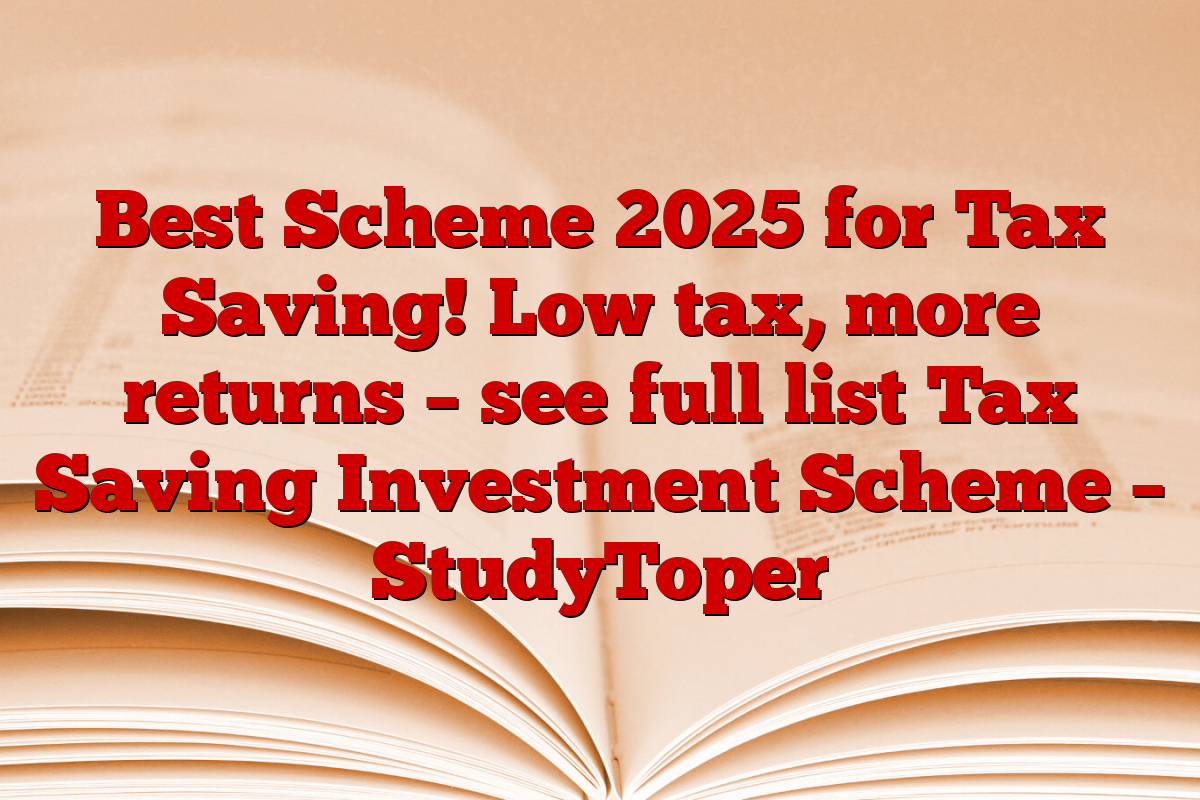Like every year, in 2025, the government and financial institutions have brought various tax saving schemes. These schemes not only help to save tax, but also make your investment safe and beneficial. The aim of tax saving schemes in India is to meet their financial goals and also take advantage of tax exemption. In this article, we will discuss in detail about the most popular and high returns of 2025 government tax saving schemes.
Tax savings schemes 2025 observation
The table below gives a brief description of the major tax saving schemes of 2025:
| Name of the scheme | Interest rate | Lock-in period | Minimum investment | Maximum investment |
| Public provident fund | 7.1% | 15 years | ₹ 500/year | ₹ 1.5 lakh/year |
| Senior civil savings scheme (scss) | 8.2% | 5 years | ₹ 1,000 | ₹ 15 lakhs |
| Sukanya samriddhi yojana (ssy) | 8.2% | By marriage/21 years | ₹ 250/year | ₹ 1.5 lakh/year |
| National savings certificate | 7.7% | 5 years | ₹ 1,000 | No limit |
| Equity Linked Saving Scheme (ELS) | Market based | 3 years | ₹ 500/month | No limit |
| Fixed deposit (FD) | 6-8% | 5 years | ₹ 1,000 | No limit |
Public provident fund
The Public Provident Fund, called PPF, is a long -term investment plan supported by the government. This scheme is ideal for those who want safe and tax-free returns.
- Benefit:
- Tax exemption: Investment in PPF gives a discount of up to ₹ 1.5 lakh under Section 80C.
- Long period: Its lock-in period is 15 years old.
- Interest Rate: Currently interest rate is 7.1%.
Civil savings scheme (scss)
The scheme is specially made for senior citizens. SCSS not only provides safe investment but also ensures regular income.
- Main characteristics:
- Interest Rate: The interest rate of SCSS for the April-June quarter has been fixed at 8.2%.
- Lock-in period: There is a five-year lock-in period, which can be extended for three years.
- Investment limit: minimum can be invested up to ₹ 1,000 and a maximum of ₹ 15 lakh.
- Tax Benefits: Under Section 80C, there is a discount of up to ₹ 1.5 lakh.
Sukanya samriddhi yojana (ssy)
This scheme is specially designed to secure the future of girls. SSY gives parents a great opportunity to save their daughter’s education and marriage.
- Benefit:
- Interest Rate: The current interest rate on SSY is 8.2%.
- Lock-in period: The girl’s wedding or her 21 years of completion.
- Tax Benefits: Investment is exempted under Section 80C.
- Minimum investment: ₹ 250 per year.
National savings certificate
National Savings Certificate, is a safe and fixed income plan suitable for small and middle income group investors.
- Main characteristics:
- Interest Rate: The current interest rate on NSC is 7.7%.
- Lock-in period: is five years old.
- Tax Benefits: Under Section 80C, there is a discount of up to ₹ 1.5 lakh.
- Minimum Investment: Can be started from ₹ 1,000.
Equity Linked Saving Scheme (ELS)
ELSS is a scheme that is connected to the stock market and provides high returns. Although it has a risk, it can be a good option to save tax and increase money.
- Benefit:
- Lock-in period: only three years old, which is less than other schemes.
- Return: ELSS Funds have given more than 15% annual returns in recent years.
- Tax Benefits: There is a discount under Section 80C.
Fixed deposit for tax savings (FD)
Bank FD is a traditional and safe investment options that help save tax.
- Main characteristics:
- Interest Rates: Interest rates on FDS ranges from about 6% to 8%.
- Lock-in period: is five years old.
- Tax Benefits: There is a discount under Section 80C.
Other plans and options
In addition, other schemes such as Atal Pension Yojana, Post Office Monthly Income Scheme, and Sovereign Gold Bonds are also available which meet different needs.
Rejuvenation
This article has been written only for the purpose of providing information and the reader will be responsible for checking the reality of the schemes given in it. All schemes are supported by the government and their rules can change from time to time. Consult your financial advisor before investing so that you can make the right decision.
